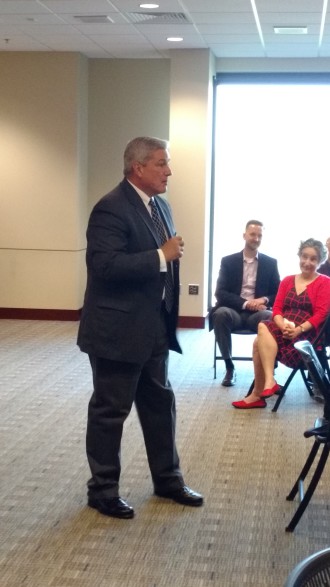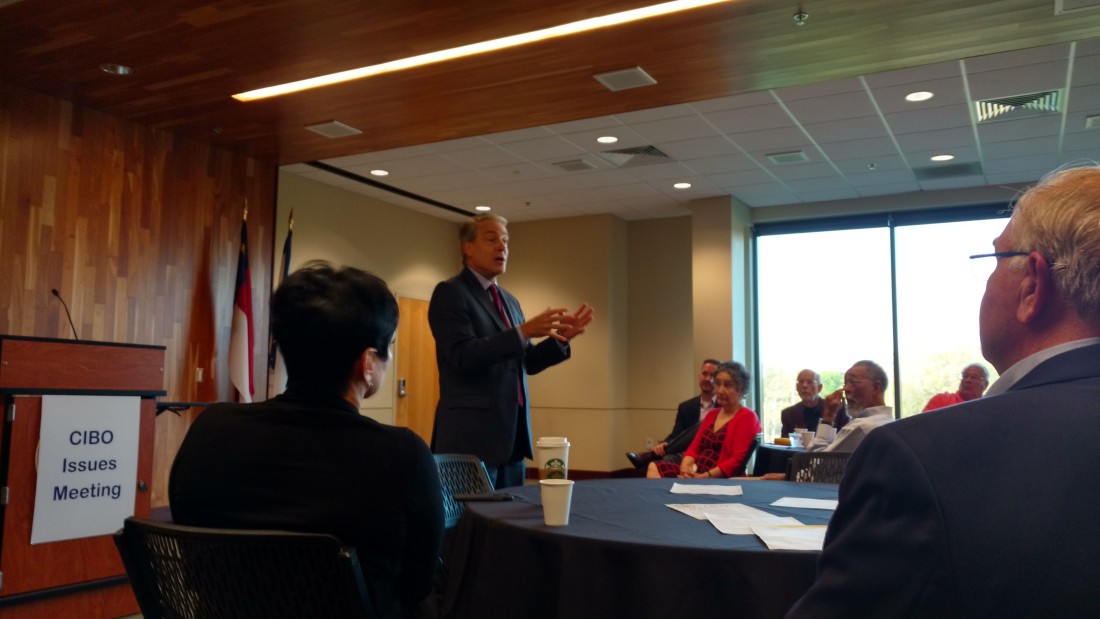At least in name, Mission Health President and CEO Dr. Ron Paulus would fit right in with a list of Roman emperors — and with the recent signing of a letter of intent to sell his local nonprofit health system to Nashville, Tenn.-based Hospital Corporation of America, he hopes to join the largest for-profit hospital empire in the U.S.
One attendee at the Council of Independent Business Owners breakfast issues meeting on May 4 brought those comparisons to mind with a reference to the fate of the Roman Empire as he asked about limits to the growth of health care systems. Roughly 50 people had gathered in the Mountain View Room of UNC Asheville’s Sherrill Center to hear Paulus report on the potential sale.
Paulus responded by reiterating a primary motivation for entering the deal: He sees system expansion through mergers as a nearly inevitable survival tactic in the current health care environment. “There are many leaders — not me, but Mayo Clinic and others — that believe within 25 years, there will be maybe four or five health systems in the U.S.,” he said. “Why? It’s because [of] what the government’s doing. There’s no way that a small health system can exist whenever the revenue to that system is cut every single year.”
Even as Mission’s expenses for drugs, medical supplies and labor to provide care continue to rise, Paulus said, government and insurance companies have resisted increases in their reimbursement rates. That issue sat at the heart of the health system’s rancorous battle with Blue Cross Blue Shield of North Carolina last year (See “Mission Health and BCBSNC Continue to Battle over Contract,” Xpress, Sept. 6, 2017).
“We don’t want to pay you another dollar,” Paulus summarized the perspective of Mission’s payers. “We don’t want to pay another dime; we don’t like what we’re paying you today.”
Beyond these expenses, Paulus added, Mission’s efforts to make health care more affordable for individuals have often succeeded at the price of its income. He gave the example of the system’s neonatal intensive care unit, which developed an at-home method for managing neonatal abstinence syndrome in babies born to mothers with opioid addictions. In 2012, the National Institute on Drug Abuse estimated the average cost of that process in a hospital as $66,700 per infant.
“Now that we can detox them at home, we’ve gone from getting paid millions for detoxing them in the hospital to not getting a cent,” Paulus said. “Our system is not just perverse, it is perverse in a way beyond imagination. And despite all the talk that insurers and others make about actually changing the model, they haven’t changed a darn thing.”
By joining with HCA, Mission hopes to take advantage of the for-profit group’s expertise in back-office functions such as billing, as well as its unparalleled buying power. Because it manages 117 hospitals in comparison to Mission’s eight, Paulus said, HCA can demand the lowest available prices from vendors. He believes that efficiency will help Mission’s facilities stay solvent in the years to come.
In turn, Paulus said that Mission’s strong performance had allowed the system to negotiate favorable terms of acquisition with HCA, including guarantees of continued operation for its regional hospitals. “They’ve agreed not to change any service for at least five years, and after the five-year period, they have to lose money for at least two years, despite doing all commercially reasonable things to avoid losing money,” he explained.
Paulus also expressed his excitement about the yet-to-be-named foundation that would emerge from the profits of the sale. Although the exact size of this nonprofit would depend on Mission’s final sale price, he estimates that a 5 percent spend rate would pump $75 million into the region annually; that computes to assets of $1.5 billion, making the foundation one of the largest in North Carolina.
“Imagine now today that we have the same health system that we had, operating at a lower cost, and $75 million plus every year to invest in other important aspects of health,” Paulus said. Through focusing on social determinants such as food access, transportation and housing, he noted, this foundation would embrace Mission’s current mission statement “to improve the health of the people of western North Carolina and the surrounding region.”
Decline and fall?

Buncombe County Sheriff Van Duncan, the meeting’s second speaker, also riffed off the Roman theme in his remarks to CIBO members. As he criticized elected officials for living “in a bubble” of negative narratives about law enforcement, he voiced concern about the course of the country’s changes to policing.
“We’ve been around about 250 years; I hope our autocorrect is not that of Roman Empire and some other democracies that have gone before us,” Duncan said. “I hope it’s a well thought through, planned-out correction.”
The sheriff, who has chosen not to run for another term in this year’s election, explained his belief that the warped perception of law enforcement was a more intractable problem than any other facing his successor. “If I had to identify the biggest challenge going forward, you guys see it every day. Look at the newspaper — no offense to the media folks — turn on the TV,” Duncan said. “We are the only profession right now I know of that are judged by the worst acts of anybody in the profession.”
Duncan’s remarks came a month after three Buncombe County commissioners — Jasmine Beach-Ferrara, Al Whitesides and Ellen Frost — publicly circulated a list of proposals to address racial bias and excessive use of force in area law enforcement agencies (avl.mx/4xh). In response, Duncan released a statement calling the proposals “a slap in the face” (avl.mx/4xi).
However, Duncan also took the opportunity to reflect on the highlights of his time in office. He expressed his pride at reducing major crime in his jurisdiction by 32.6 percent over the past decade, even as the county’s population swelled and Asheville’s crime rate increased by 7 percent. He also pointed to his office’s Community Oriented Policing Services program, which won an award from the National Association of Counties in 2014.
As sheriff candidates Randy Smart and R. Daryl Fisher sat in the audience, Duncan closed by emphasizing that whoever takes up his mantle should advocate for increased staffing to better serve residents. After 5 p.m., he noted, his office covers 90 percent of the county with an average of 14 people a shift. “We’re getting to that critical point of being able to have enough folks to field these calls for service and be able to do the job that I feel like we need to be able to do in the community.”



“Why? It’s because [of] what the government’s doing. There’s no way that a small health system can exist whenever the revenue to that system is cut every single year”
The Mission CMO was at one of the “Medicare for All” events this week and said that Mission employs more billing staff than it has either nurses or beds. Selling off to HCA is both a way to win fights with insurers and reduce billing jobs.
Small hospital groups and independent specialists can and do survive in universal insurance systems where reimbursement rates are negotiated by all providers and applied to all providers. Weird how Paulus never advocated for that at any point, and instead tried his own rapid acquisition strategy.